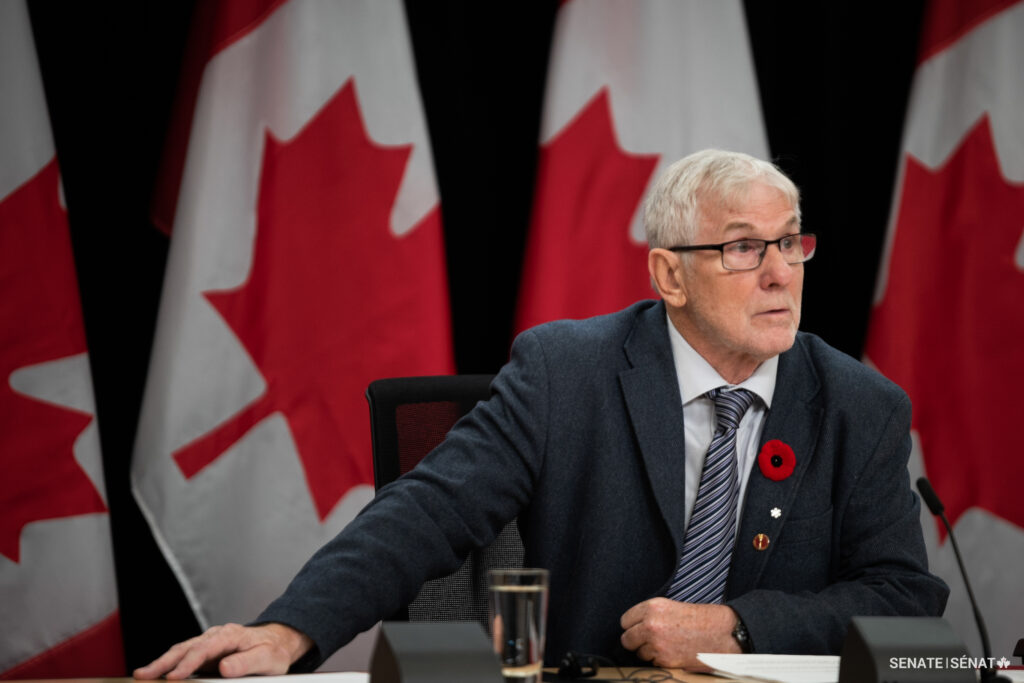
Features
Q&A
Q&A: Senator David Richards
March 7, 2024 By Brittani Schroeder
 Photo credit: Senate of Canada
Photo credit: Senate of Canada Editor Brittani Schroeder spoke with Senator David Richards, the Chair of the Senate Subcommittee on Veterans Affairs, about a recent study conducted on psychedelic therapy and how it may aid military veterans.
Q: Can you tell us about the study?
The Senate’s Subcommittee on Veterans Affairs was deeply concerned by the alarming rates of suicide and mental health disorders among Canada’s veteran populations. Canada’s veterans die by suicide at a much higher rate than any other Canadian — 50 per cent higher for male veterans, 200 per cent higher for female veterans and 250 per cent higher for male veterans under the age of 25.
The mental health rates for these demographics are also distressing; about 10 to 15 per cent of Canadian veterans have been diagnosed with posttraumatic stress disorder (PTSD).
Veterans Affairs Canada offers different therapeutic programs and medications, but it’s clear that too many veterans are still struggling. We launched a study on psychedelic-assisted therapies with the hope that we could help find an alternative solution for our veterans.
While we didn’t look specifically at law enforcement in this study, some of the factors that complicate the treatment of veterans can also affect police. Former senator and retired general Roméo Dallaire told us about the concept of “moral injury.” Moral injury can occur when soldiers face ethical dilemmas, like whether to take a life. Police officers thrust into dynamic situations sometimes must make difficult decisions where death and injury can result. In that sort of situation, the consequences to the officer’s mental health would likely be similar to what a soldier might experience.
Q: There are many different types of therapies and medications out there for veterans already. Why was it important to look at the use of psychedelic-assisted psychotherapies?
Military- or combat-related PTSD does not often respond well to conventional treatments like psychotherapy and slow-acting antidepressants. In fact, those treatments can make things worse. However, the emerging evidence around psychedelics — such as psilocybin (magic mushrooms) and MDMA — shows promise.
But in Canada, legal restrictions on these substances greatly limit access to psychedelic-assisted therapy. Large-scale clinical research is currently the only way to make this treatment accessible to veterans who have exhausted all other avenues.
As a subcommittee, we believe that Canada should explore every possible option to help our veterans get treatment that works. We owe it to them.
Q: What does the use of these substances in therapy potentially offer to veterans that other therapies currently do not?
Existing therapies are gruelling and often ineffective. In exposure therapy, for instance, the patient is forced to relive the traumatic event over and over again in the therapy room. The idea is that, eventually, the patient is desensitized to the trauma. But it’s extremely difficult for the patient and the dropout rate is high — about half.
There are only two kinds of medication approved for PTSD treatment. The drugs are what are known as “selective serotonin reuptake inhibitors,” which are slow-acting anti-depressants. It can take weeks or even months before any therapeutic benefit is seen, and the side effects can be very nasty. Even then, about 40 per cent of patients don’t respond at all to this treatment, with many others experiencing only mixed success.
From what we’ve heard, psychedelics seem to be gentler and to work more quickly. MDMA-assisted therapy, for example, can quickly facilitate the creation of a strong bond with the therapist and it seems to help process trauma. Psilocybin appears to help treat depression — in one study 30 per cent of patients were in remission by just the third week of taking the drug — and it is being studied as a PTSD treatment.
Q: Other countries have started studying this type of therapy already. What has been learned from those that have begun the research process?
Preliminary studies have yielded promising results. The U.S. Food and Drug Administration has designated psilocybin and MDMA as “breakthrough therapies” and the U.S. Department of Veterans Affairs has conducted clinical studies to determine whether this type of psychotherapy should be available to veterans experiencing treatment-resistant symptoms. In July 2023, Australia authorized psilocybin-assisted therapy in the treatment of cases of depression that are resistant to other treatments, and MDMA-assisted psychotherapy for the treatment of PTSD.
Despite this emerging evidence, we cannot wait for the results from other countries because we would still need our own research to confirm the effectiveness of these treatments.
Unfortunately, Canada has adopted a “wait-and-see approach” that is failing veterans struggling with major mental health problems.
Q: What is the goal of the recently released report?
We are urging federal, provincial and territorial governments, as well as the Canadian Institutes of Health Research, to immediately launch and fund a large-scale research program on psychedelic-assisted therapy.
Right now, we really need to know more so informed decisions can be made about the most appropriate treatment for veterans with PTSD and other mental health problems. There’s still a lot that we don’t know about psychedelic-assisted therapy — but if it proves effective, we want veterans to have access to it. The statistics we outlined in your first question show clearly that the current approach is just not good enough.
Print this page